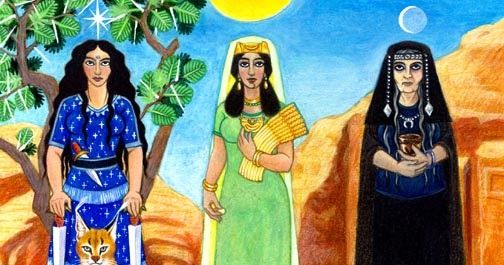Like we’ve been saying for a long time Hindus shouldn’t just see the Ayodhya Ram Temple not just a victory for Hindu resistance and survival while most of the ancient world ended up in the museum but should also see this as a victory for all indigenous ancient traditions which are slowly reviving who need a boost. This is also why Hindus should be inviting other ‘Pagan Heathen’ representatives from across the world to Ayodhya.
Also, you can see why these Hinduphobic racist Western media go on and on about imaginary Hindu ‘nationalism’ and supremacy’ and deny Hinduphobia because they are part of the filthy racist and religious monotheist globalists who are worried that if Hinduphobia officially gets recognition then it opens the pandora’s box of bringing all the genocides and destruction of other ancient civilizations into open. Which is true it will and we will make sure it does.
Unfortunately for them, Karma always has the last laugh that it was the British media itself that was using the term ‘Hinduphobia’ back in the 1860s. And this is why they are also worried that the Ram Temple will give more confidence to the worldwide Pagan movement to take control of their sacred places that are under occupation.
Never fall for their self-given awards of being ‘liberals’ progressives’ ‘woke’ because they use that as a cover to sound so liberated and enlightened like their forefather colonists who claimed they were so ‘civilized and enlightened’ that they weren’t coming to enslave and rob but were actually coming to help the ‘heathen pagan savages’ by civilizing them via forced conversions, slavery, and genocide
A wave of apparent Saudi social media accounts have been promoting and calling for the return of ancient Arabian deities as part of the kingdom’s national heritage, amid the country’s push to replace its religious identity with a more nationalist one.
One user on X, formerly Twitter, posted pictures of the ancient Arabian goddess ‘Al-Uzza’, showing imitated rituals surrounding the statue and existing figures of it displayed in Saudi museums.
According to that user, “from [the] past to [the] future al uzza is always there”. As Saudi Arabians, the user wrote, citizens are “deeply connected with our past ” and it “doesn’t matter if we’re Muslims or not”.
Due to the statues and deities being part of the peninsulas history, the “Saudi government gives so much importance for the ancient Arabian gods”, reportedly because “our past is a part of our future”.
from past to future al uzza is always there
we’re as Saudi Arabians, deeply connected with our past.
doesn’t matter if we’re Muslims or not
It’s an arabic history.
Saudi government gives so much importance for the ancient Arabian gods
our past is a part of our futurehttps://t.co/XkfND27kH1 pic.twitter.com/VUruKh7Kjl
— جـضّـة
(@msss4_) November 24, 2023
The user also cited the three main ‘goddesses’ of the pre-Islamic polytheistic pantheon – Al-Lat, Manat, and Al-Uzza – as “our ancient history” and symbols of female empowerment. “Since ancient times, Arabs have sanctified the female entity. We should be proud of our history and abolish the stereotypical and distorted image of female infanticide.”
Claiming that in Arabian culture women “were the ideal, integrated entity among the Arabs”, allowing belief in goddesses to flourish. The user and its affiliated or friendly accounts even justified the pre-Islamic practice of burying one’s newborn or young daughters, saying that “female infanticide was not due to shame, as some claim”, but instead to offer “girls as sacrifices” to the “feminine trinity”.
اللات ومناة والعزى تاريخنا العريق
العرب منذ القدم قدسوا الكيان الأنثوي، المفروض نفتخر بتاريخنا ونلغي الصورة النمطية والمحرفة عن وأد البنات
النساء كُنَّ الكيان المثالي المتكامل عند العرب، نصبوهم ثالوث انثوي يقدمون البنات قربان لهم. ماكان وأد البنات بسبب العار كما يتداول البعض https://t.co/ztp5sppvzG pic.twitter.com/q2PtzwHZPt— جـضّـة
(@msss4_) November 24, 2023
Some users blamed the Sahwa (Awakening) movement for the kingdom’s former opposition to exploiting the ancient Al-Lat, Manat, and Al-Uzza and related antiquities for purposes of tourism and national heritage, with one account saying that the movement’s influence “reached down to history. It erased it and erased it from the memory of the Saudi person. It distorted the concept of history, civilization, heritage, antiquities, and identity. How many years ago, anyone who talked about antiquities seemed as if he was talking about something polytheistic or about bringing back the worship of idols to Saudi Arabia”.
Another user echoed those sentiments, claiming that the phenomenon was a “direct result of the [Muslim] Brotherhood and the Sahwa’s control over education and the media…They had complete control over our schools for more than 40 years, during which most Saudis were completely brainwashed!”
The Sahwa movement was a political Islamic branch consisting of religious scholars and figures, holding significant influence in the kingdom and over its policies throughout the decades. It flourished from the 1960s through to the 1980s and beyond, reportedly being partly influenced by Muslim political exiles from Egypt and other states that persecuted and exiled their figures.
It was Saudi crown prince Mohammed bin Salman who eventually moved against the movement and many of its scholars since 2017, promoting and implementing a wave of drastic reforms that got rid of many of the restrictions on Saudi society and the entertainment industry. Many of the remaining figures affiliated with the Sahwa movement have also been rounded up and arrested by Saudi authorities, signifying a clear overhaul of the country’s system and identity.
A key part of those reforms has been in the tourism sector, with the kingdom developing its national heritage sites including the recovery of artefacts depicting the ancient Arabian pagan pantheon.
Although supporters of the Saudi government and crown prince bin Salman insist that it is simply the preservation of the kingdom’s history and national heritage, and that Saudis should take pride in all aspects of their past, many religious figures and users – even Saudis themselves – have expressed outrage at the depiction of the ancient Arabian deities by apparent Saudi accounts, criticising it as an attempted revival of the polytheistic pantheon that Islam directly opposes.
As Muslim American YouTuber and writer Daniel Haqiqatjou stated on X, “A major component of secularizing Muslim countries is creating a nationalistic narrative that revolves around an ancient and long-lost forgotten religion that predates Islam.” He added that in order to “secularize their country, the Saudi authorities are allowing the revival of the pagan idols that Islam destroyed.”
Some X users have dismissed the apparent Saudi accounts as being run by either Zionist or Hindutva individuals from abroad, yet some others have accused them of being ‘bot’ accounts supported and sponsored by the Saudi government. None of the accusations have yet been confirmed.
The effort by the Saudi government to revive its national heritage, however, comes amid other moves promoted by Riyadh to build a more nationalist and historical narrative, such as the implementation of the Saudi Founding Day for the first time in 2022. Set on 22 February, the Founding Day commemorates the enthronement of the Saudi royal family’s forefathers Muhammad ibn Saud in 1727, when he became emir of the oasis town of Diriyah.
That national holiday and the celebration of ibn Saud himself seeks to replace the traditional narrative instituted by followers of the 18th century Islamic scholar Muhammad ibn Abdul-Wahhab, whose interpretation of Islam was favoured by ibn Saud and resulted in the alliance of both men and their descendants or followers throughout the centuries since. Critics of the Saudi government’s recent reforms and nationalist narrative, therefore, criticise those efforts as divorcing the Saudi state from its religious identity. 



































